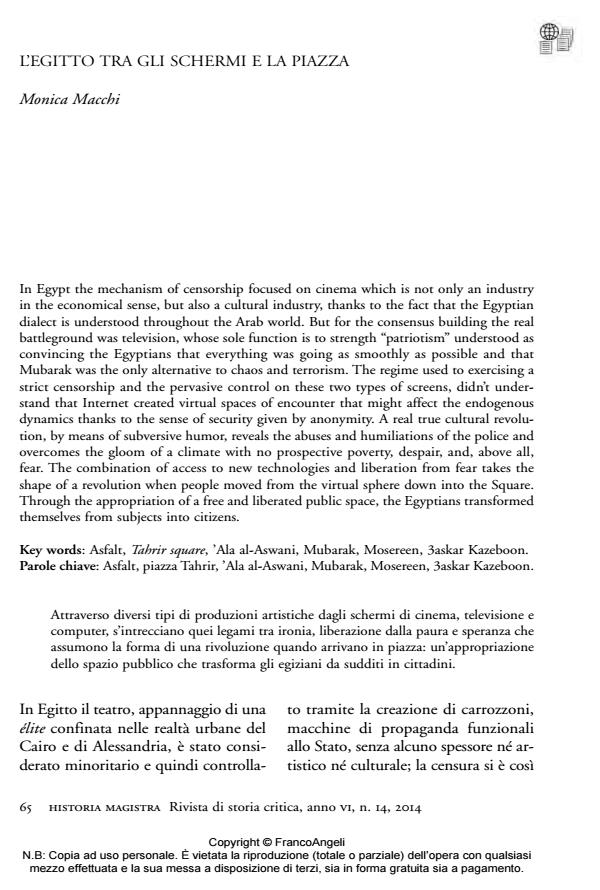L’Egitto tra gli Schermi e la Piazza
Titolo Rivista HISTORIA MAGISTRA
Autori/Curatori Monica Macchi
Anno di pubblicazione 2014 Fascicolo 2014/14
Lingua Italiano Numero pagine 11 P. 65-75 Dimensione file 290 KB
DOI 10.3280/HM2014-014008
Il DOI è il codice a barre della proprietà intellettuale: per saperne di più
clicca qui
Qui sotto puoi vedere in anteprima la prima pagina di questo articolo.
Se questo articolo ti interessa, lo puoi acquistare (e scaricare in formato pdf) seguendo le facili indicazioni per acquistare il download credit. Acquista Download Credits per scaricare questo Articolo in formato PDF

FrancoAngeli è membro della Publishers International Linking Association, Inc (PILA), associazione indipendente e non profit per facilitare (attraverso i servizi tecnologici implementati da CrossRef.org) l’accesso degli studiosi ai contenuti digitali nelle pubblicazioni professionali e scientifiche.
In Egypt the mechanism of censorship focused on cinema which is not only an industryin the economical sense, but also a cultural industry, thanks to the fact that the Egyptiandialect is understood throughout the Arab world. But for the consensus building the realbattleground was television, whose sole function is to strength "patriotism" understood asconvincing the Egyptians that everything was going as smoothly as possible and thatMubarak was the only alternative to chaos and terrorism. The regime used to exercising astrict censorship and the pervasive control on these two types of screens, didn’t understandthat Internet created virtual spaces of encounter that might affect the endogenousdynamics thanks to the sense of security given by anonymity. A real true cultural revolution,by means of subversive humor, reveals the abuses and humiliations of the police andovercomes the gloom of a climate with no prospective poverty, despair, and, above all,fear. The combination of access to new technologies and liberation from fear takes theshape of a revolution when people moved from the virtual sphere down into the Square.Through the appropriation of a free and liberated public space, the Egyptians transformedthemselves from subjects into citizens.
Parole chiave:Asfalt, piazza Tahrir, ’Ala al-Aswani, Mubarak, Mosereen, 3askar Kazeboon
Monica Macchi, L’Egitto tra gli Schermi e la Piazza in "HISTORIA MAGISTRA" 14/2014, pp 65-75, DOI: 10.3280/HM2014-014008